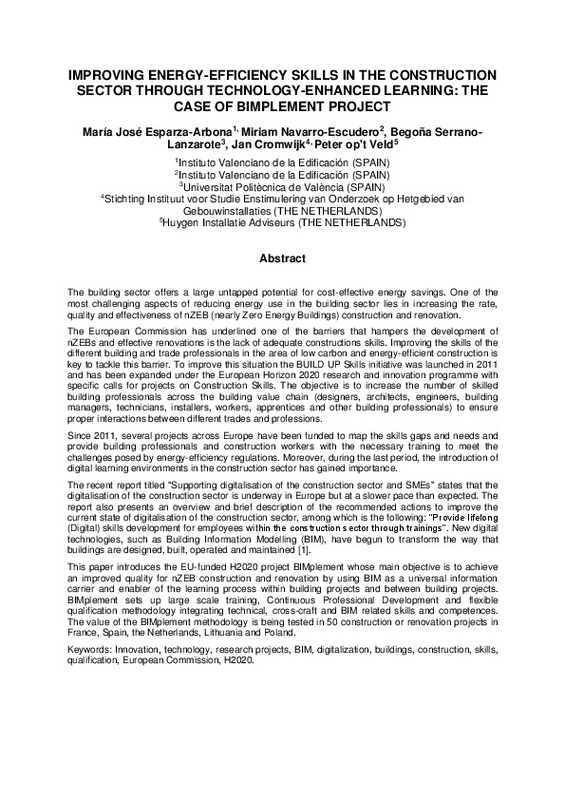JavaScript is disabled for your browser. Some features of this site may not work without it.
Buscar en RiuNet
Listar
Mi cuenta
Estadísticas
Ayuda RiuNet
Admin. UPV
Improving energy-efficiency skills in the construction sector through technology-enhanced learning: the case of BIMplement project
Mostrar el registro sencillo del ítem
Ficheros en el ítem
| dc.contributor.author | Esparza-Arbona, María José
|
es_ES |
| dc.contributor.author | Navarro-Escudero, Miriam
|
es_ES |
| dc.contributor.author | Serrano Lanzarote, Apolonia Begoña
|
es_ES |
| dc.contributor.author | Cromwijk, Jan
|
es_ES |
| dc.contributor.author | Op't Veld, Peter
|
es_ES |
| dc.date.accessioned | 2022-01-21T08:26:55Z | |
| dc.date.available | 2022-01-21T08:26:55Z | |
| dc.date.issued | 2020-07-07 | es_ES |
| dc.identifier.isbn | 978-84-09-17979-4 | es_ES |
| dc.identifier.uri | http://hdl.handle.net/10251/180064 | |
| dc.description.abstract | [EN] The building sector offers a large untapped potential for cost-effective energy savings. One of the most challenging aspects of reducing energy use in the building sector lies in increasing the rate, quality and effectiveness of nZEB (nearly Zero Energy Buildings) construction and renovation. The European Commission has underlined one of the barriers that hampers the development of nZEBs and effective renovations is the lack of adequate constructions skills. Improving the skills of the different building and trade professionals in the area of low carbon and energy-efficient construction is key to tackle this barrier. To improve this situation the BUILD UP Skills initiative was launched in 2011 and has been expanded under the European Horizon 2020 research and innovation programme with specific calls for projects on Construction Skills. The objective is to increase the number of skilled building professionals across the building value chain (designers, architects, engineers, building managers, technicians, installers, workers, apprentices and other building professionals) to ensure proper interactions between different trades and professions. Since 2011, several projects across Europe have been funded to map the skills gaps and needs and provide building professionals and construction workers with the necessary training to meet the challenges posed by energy-efficiency regulations. Moreover, during the last period, the introduction of digital learning environments in the construction sector has gained importance. The recent report titled "Supporting digitalisation of the construction sector and SMEs" states that the digitalisation of the construction sector is underway in Europe but at a slower pace than expected. The report also presents an overview and brief description of the recommended actions to improve the current state of digitalisation of the construction sector, among which is the following: ¿Provide lifelong (Digital) skills development for employees within the construction sector through trainings¿. New digital technologies, such as Building Information Modelling (BIM), have begun to transform the way that buildings are designed, built, operated and maintained [1]. This paper introduces the EU-funded H2020 project BIMplement whose main objective is to achieve an improved quality for nZEB construction and renovation by using BIM as a universal information carrier and enabler of the learning process within building projects and between building projects. BIMplement sets up large scale training, Continuous Professional Development and flexible qualification methodology integrating technical, cross-craft and BIM related skills and competences. The value of the BIMplement methodology is being tested in 50 construction or renovation projects in France, Spain, the Netherlands, Lithuania and Poland. | es_ES |
| dc.language | Inglés | es_ES |
| dc.publisher | IATED Academy | es_ES |
| dc.relation.ispartof | EDULEARN20 Proceedings | es_ES |
| dc.rights | Reserva de todos los derechos | es_ES |
| dc.subject | Innovation | es_ES |
| dc.subject | Technology | es_ES |
| dc.subject | Research projects | es_ES |
| dc.subject | BIM | es_ES |
| dc.subject | Digitalization | es_ES |
| dc.subject | Buildings | es_ES |
| dc.subject | Construction | es_ES |
| dc.subject | Skills | es_ES |
| dc.subject | Qualification | es_ES |
| dc.subject | European commission | es_ES |
| dc.subject | H2020 | es_ES |
| dc.subject.classification | MECANICA DE LOS MEDIOS CONTINUOS Y TEORIA DE ESTRUCTURAS | es_ES |
| dc.title | Improving energy-efficiency skills in the construction sector through technology-enhanced learning: the case of BIMplement project | es_ES |
| dc.type | Comunicación en congreso | es_ES |
| dc.type | Capítulo de libro | es_ES |
| dc.identifier.doi | 10.21125/edulearn.2020.1224 | es_ES |
| dc.rights.accessRights | Abierto | es_ES |
| dc.contributor.affiliation | Universitat Politècnica de València. Departamento de Mecánica de los Medios Continuos y Teoría de Estructuras - Departament de Mecànica dels Medis Continus i Teoria d'Estructures | es_ES |
| dc.contributor.affiliation | Universitat Politècnica de València. Departamento de Composición Arquitectónica - Departament de Composició Arquitectònica | es_ES |
| dc.description.bibliographicCitation | Esparza-Arbona, MJ.; Navarro-Escudero, M.; Serrano Lanzarote, AB.; Cromwijk, J.; Op't Veld, P. (2020). Improving energy-efficiency skills in the construction sector through technology-enhanced learning: the case of BIMplement project. IATED Academy. 4646-4653. https://doi.org/10.21125/edulearn.2020.1224 | es_ES |
| dc.description.accrualMethod | S | es_ES |
| dc.relation.conferencename | 12th International Conference on Education and New Learning Technologies (EDULEARN 2020) | es_ES |
| dc.relation.conferencedate | Julio 06-07,2020 | es_ES |
| dc.relation.conferenceplace | Online | es_ES |
| dc.relation.publisherversion | https://doi.org/10.21125/edulearn.2020.1224 | es_ES |
| dc.description.upvformatpinicio | 4646 | es_ES |
| dc.description.upvformatpfin | 4653 | es_ES |
| dc.type.version | info:eu-repo/semantics/publishedVersion | es_ES |
| dc.relation.pasarela | S\417653 | es_ES |








